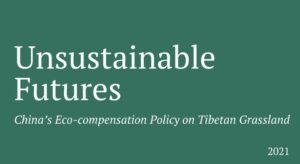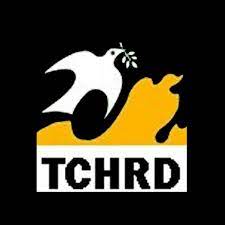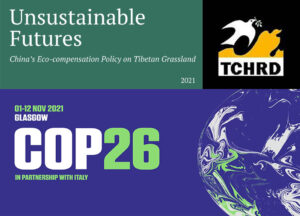 China’s eco-compensation policy on Tibetan grassland comes under the spotlight in the new report Unsustainable Futures published this month by the Tibetan Centre for Human Rights and Democracy (TCHRD)* ahead of the COP26 Summit** in Glasgow, UK, next month. They look at China’s carbon trading scheme which attempts to offset its reliance on coal fired electricity,which includes plans to build many more coal-fired power stations, and China’s use of this scheme to “repair reputational damage”.
China’s eco-compensation policy on Tibetan grassland comes under the spotlight in the new report Unsustainable Futures published this month by the Tibetan Centre for Human Rights and Democracy (TCHRD)* ahead of the COP26 Summit** in Glasgow, UK, next month. They look at China’s carbon trading scheme which attempts to offset its reliance on coal fired electricity,which includes plans to build many more coal-fired power stations, and China’s use of this scheme to “repair reputational damage”.
The report describes how China has been “persistently accumulating its climate capital, through its rhetoric of ecological civilisation construction, carbon trading, grain to green, closing pastures to grow more grass” and goes on to say, “China has much to say on eco-compensation, intrinsic to China’s credentials as a climate leader and as benevolent governance of ecosystem services and respect for those who provide them”. The report examines what these policies mean on the ground, and the effect they are having on the people concerned, with particular reference to the Tibetan nomads whose centuries-long, traditional and sustainable lifestyle, as well as the long-term sustainability of the land, is being eroded by China’s desire to be seen as offsetting its unsustainable use of the coal-fired electricity on which it relies.
 “Tibet and the Tibetans provide ecosystem services for the whole of Asia and well beyond”, says TCHRD. They go on to say that “China is now in a competitive race with the US on climate action and environmental progress” and talks of a world that “hopes that, on this issue, China and the US can cooperate, even if they are hostile to each other on almost all else”.
“Tibet and the Tibetans provide ecosystem services for the whole of Asia and well beyond”, says TCHRD. They go on to say that “China is now in a competitive race with the US on climate action and environmental progress” and talks of a world that “hopes that, on this issue, China and the US can cooperate, even if they are hostile to each other on almost all else”.
The report continues, “None of China’s regulatory and policy frameworks on environmental conservation integrates the human rights based approach to protect communities from harmful effects of displacement and climate change” and backs this up with documented testimonies of people who have lived in the areas affected and can give first hand accounts of the impact of China’s policies.
TCHRD makes observations and recommendations which focus on the traditional Tibetan nomad lifestyle and its respect for the environment, and its sustainability. China’s policies do not respect these factors and their policy of nomad displacement “is unscientific, contravenes available evidence, and should be declared a contravention of Article 8 (j) of the Convention on Biodiversity”. They say that this policy also contravenes the human rights of the nomads and that any schemes should “empower local communities by respecting their human rights, including land tenure security and freedom from forced removal from their ancestral lands”.
 Water security for the millions of people living in the countries downstream of Tibet is discussed, saying that if “upper river reaches are not adequately protected, active protection measures downstream will have limited effect.Construction of further hydro dams, especially high walls dams, is not compatible with river protection, and fish biodiversity protection”.
Water security for the millions of people living in the countries downstream of Tibet is discussed, saying that if “upper river reaches are not adequately protected, active protection measures downstream will have limited effect.Construction of further hydro dams, especially high walls dams, is not compatible with river protection, and fish biodiversity protection”.
The report concludes, “China’s policy responses for climate change mitigation and adaptation undermine sustainable development and traditional livelihood sources on the Tibetan Plateau [… ]Eco-compensation policies must be inclusive in nature and recognise the role of local nomadic communities in pursuing sustainable and productive livelihood sources”.
*The Tibetan Centre for Human Rights and Democracy (TCHRD) is a registered non-government human rights organisation based in Dharmashala with the mission to protect the human rights of the Tibetan people in Tibet and promote the principles of democracy in the exile Tibetan community.
*COP26, the UN Climate Change Conference UK 2021, taking place in Glasgow October 31 – November 12, will “bring parties together to accelerate action towards the goals of the Paris Agreement and the UN Framework Convention on Climate Change”.




 Print
Print Email
Email